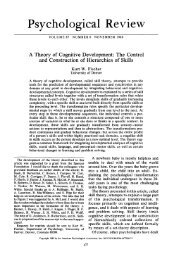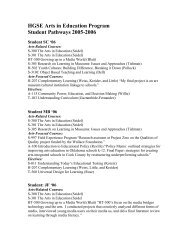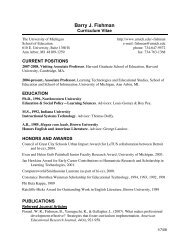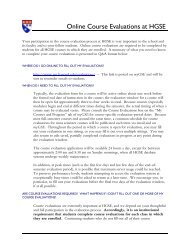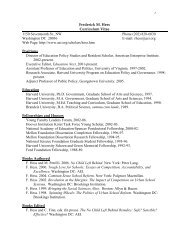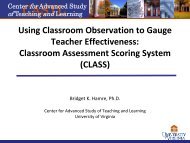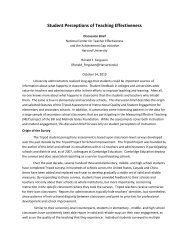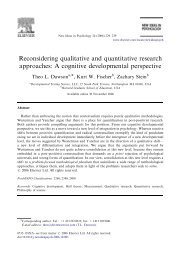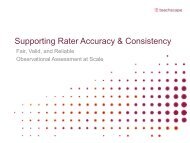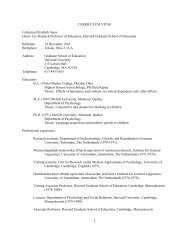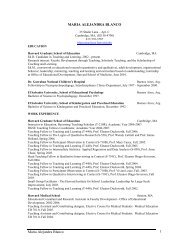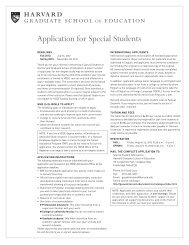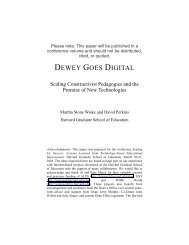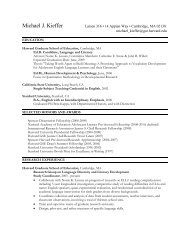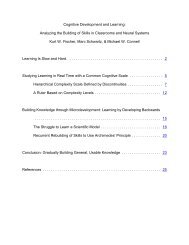1 617 496 6949 124 Mt Auburn St. Email: veronica@pz.harvard.edu ...
1 617 496 6949 124 Mt Auburn St. Email: veronica@pz.harvard.edu ...
1 617 496 6949 124 Mt Auburn St. Email: veronica@pz.harvard.edu ...
Create successful ePaper yourself
Turn your PDF publications into a flip-book with our unique Google optimized e-Paper software.
VERONICA M. BOIX MANSILLA<br />
Harvard Graduate School of Education<br />
Project Zero, Phone: 1 <strong>617</strong> <strong>496</strong> <strong>6949</strong><br />
<strong>124</strong> <strong>Mt</strong> <strong>Auburn</strong> <strong>St</strong>. <strong>Email</strong>: <strong>veronica@pz</strong>.<strong>harvard</strong>.<strong>edu</strong><br />
Cambridge, MA 02138<br />
I. EDUCATION<br />
Ed. D. Human Development and Psychology 2001<br />
Harvard Graduate School of Education<br />
Ed. M. Harvard Graduate School of Education. 1992<br />
Lic. Educación, Universidad de Buenos Aires 1989<br />
II. CURRENT POSITIONS<br />
Harvard Graduate School of Education<br />
Lecturer in Education<br />
Course title: Interdisciplinary Education: Preparing <strong>St</strong>udents for our Contemporary World<br />
Research Associate, Project Zero<br />
Principal investigator Successful Interdisciplinarity.<br />
Empirical examination of cognitive platforms enabling interdisciplinary<br />
collaborations in high end research groups 2008-2010<br />
Principal investigator, Interdisciplinary <strong>St</strong>udies Project.<br />
<strong>St</strong>udy of expert interdisciplinary work and <strong>edu</strong>cation in exemplary research<br />
institutions and collegiate and pre-collegiate programs 2001 –present.<br />
Principal Investigator, Interdisciplinary Teaching in the International Baccalaureate.<br />
Documentation of best practices in interdisciplinary teaching in IBO schools July<br />
2006 – 2008<br />
Director and co-founder, L@titud Latin American Initiative Toward Understanding and<br />
Development<br />
Large scale initiative to link Project Zero's research to <strong>edu</strong>cational programs in<br />
Latin America. June 2000 -present.<br />
1
III. RESEARCH AWARDS<br />
Canadian Institute for Advanced Research 2008 - 2010<br />
The International Baccalaureate 2007 - 2008<br />
The Atlantic Philanthropies 2005<br />
Harvard Graduate School of Education 2003- 2004<br />
The Atlantic Philanthropies, 2001 - 2007<br />
Organization of American <strong>St</strong>ates 2001 - 2003<br />
Rockefeller Center for Latin American <strong>St</strong>udies 2001<br />
Project Zero <strong>St</strong>eering Committee. 2001<br />
OTHER HONORS (SELECTED)<br />
Spencer Research Training Grant. 1995 - 1997<br />
Organization of American <strong>St</strong>ates. 1994 - 1995<br />
Ministerio Nacional de Cultura y Educación, Argentina. 1994 - 1995<br />
World Laboratory, Geneva. 1991 - 1992<br />
CONICET, Argentina 1991 - 1993.<br />
IV. PAST POSITIONS<br />
(A) SELECTED RESEARCH EXPERIENCE<br />
Harvard Graduate School of Education - Project Zero<br />
Assessing Historical Understanding – (with Facing History and Ourselves)<br />
Developed and tested a conceptual framework and practical tools to assess students’ developing<br />
understanding in history. 1996 – 1998.<br />
Understanding for Organizations Project.<br />
<strong>St</strong>udy of adult representations and transformation of organizational practices. 1996 - 1998.<br />
ATLAS Seminar Project (Assessment Teaching and Learning for all <strong>St</strong>udents).<br />
<strong>St</strong>udied role of disciplinary knowledge in curriculum reform. 1993 – 1995.<br />
Teaching for Understanding Project.<br />
Research Assistant. Developed Dimensions of Understanding Framework 1991- 1995.<br />
University of London, School of Education.<br />
CHATA Project.<br />
Visiting researcher in study of children’s historical epistemologies.<br />
Massachusetts Institute of Technology.<br />
Nature of Science Project.<br />
2
Methodological design and data analysis investigating fifth grade students’ developing epistemologies of<br />
science. With Susan Carey and Carol Smith. 1994 – 1996. Spencer Research Training.<br />
History Department. Literature review on theories, methods, and uses of history. With Prof. Peter<br />
Perdue. 1995-1996 Spencer Research Training.<br />
Consejo Nacional de Investigación en Ciencia y Técnica, Argentina.<br />
Research Fellow Conceptual research on disciplinary and meta-disciplinary understanding in history<br />
and science leading to dimensions of understanding framework 1991–1992. <strong>St</strong>udy of the incidence of<br />
classroom discourse on the construction of scientific concepts among college freshmen 1988- 1989.<br />
Universidad de Buenos Aires.<br />
Organizadores avanzados visuales y su papel en el aprendizaje Research Assistant. Interviews, data<br />
analysis, writing.<br />
(B) SELECTED TEACHING EXPERIENCE<br />
Pre-collegiate and Collegiate Institutions ( e.g. Washington Center for the Improvement of<br />
Undergraduate Education; San Francisco Bay Area Collaborative, Boston Arts Academy, International<br />
Baccalaureate, Universidad de Bogota Jorge Tadeo Lozano, Universidad Torcuato DiTella). Professional<br />
development. 1994 – present.<br />
HGSE - Project Zero Summer Institute. Faculty., 1996 – present.<br />
Central Park East Secondary School. Autobiography and History. Visiting Faculty, Fall 1996.<br />
Universidad de Buenos Aires. Intellectual work and learning. Lecturer, 1989-1990.<br />
Bichito de Luz. Pedagogical coordinator, Buenos Aires, 1996-97.<br />
Colegio Godspell. Fifth grade teacher, 1983-1987.<br />
V. CONFERENCES<br />
(a ) SELECTED INVITED PRESENTATIONS/KEYNOTES<br />
Harvard Project on Negotiations. Keynote “Interdisciplinary Work: Integrating perspectives to<br />
produce a cognitive advancement” Cambridge December, 2007.<br />
Washington Center for the Improvement of Undergraduate Education: Keynote/workshop<br />
“Assessing student interdisciplinary learning, questions of quality.” Seattle, March 2006, March 2007.<br />
Alliance for International Education: “From teaching of globalization - to nurturing global<br />
consciousness.” Shanghai, Oct. 2006.<br />
3
World Knowledge Dialogue: “Nurturing <strong>St</strong>udents Capacity to Bridge.” Crans-Montana Switzerland,<br />
Sept. 2006.<br />
AACU-Carnegie Foundation Integrative Learning Initiative Keynote “The question of quality in<br />
interdisciplinary work”. Washington DC, March 2006<br />
A stronger Massachusetts: Connecting our schools to the world. Massachusetts initiative for<br />
international studies. “Interdisciplinary teaching of Globalization.” Boston, Nov. 2005.<br />
International Conference on Globalization and Learning. Paper: “Teaching for Global<br />
Consciousness, Conceptualizations and Practical Tales.” <strong>St</strong>ockholm, March 2005.<br />
International Baccalaureate Regional Meetings. Keynote: “Toward a model for teaching and<br />
assessing interdisciplinary understanding.” Amsterdam, March 2005 and Buenos Aires, Sept. 2005.<br />
Social Science Research Council. “Assessing Interdisciplinary Products of Work and Habits of Mind<br />
in Liberal Arts Institutions.” New York, April 2005, April 2006.<br />
European Association for Social <strong>St</strong>udies of Science and Technology. Paper: “Assessing<br />
interdisciplinary research at the frontier.” Paris, Aug. 2004.<br />
Centre Nationale de Recherche Scientifique – Interdisciplines. Paper and discussion: “Assessing<br />
interdisciplinary work at the frontier” On-line Seminar 2003-2004.<br />
Association for Integrative <strong>St</strong>udies. Annual Meeting. Paper: “Interdisciplinary work at the frontier, an<br />
empirical exploration.” Detroit, Oct. 2003.<br />
Southern Australia Ministry of Education, Curriculum Division. Keynote: What is Interdisciplinary<br />
learning and why does it matter? Australia, Feb. 2003.<br />
Fundación Omar Dengo. “Teaching for Understanding: theory and practice.” Keynote Aug, 2001; and<br />
“Interdisciplinary work and assessment.” Aug 2003. Costa Rica.<br />
Asociación de Escuelas Católicas. Keynote: “What is understanding and why matters” Keynote. San<br />
Juan Puerto Rico, 2002 and 2003.<br />
Ministerio de Educacion Nicaragua Keynote: “Enseñar para la comprension, desafios de una<br />
reforma de calidad”. June 2003.<br />
Facing History and Ourselves National <strong>St</strong>aff Development Conference. Keynote: “Assessing<br />
historical understanding.” Brookline, July 1998.<br />
Teaching, Learning. and Knowing History. Paper: “Can they use what they have learned to make<br />
sense of the present? Historical Understanding beyond the past and into the present” Samuel Wineburg,<br />
Peter Seixas, and Peter <strong>St</strong>erns Chairs. Pittsburgh, Nov. 1998.<br />
ATLAS Seminar Assessment Teaching and Learning for All <strong>St</strong>udents. Papers: “Distinguishing<br />
subject matters from disciplinary ways of knowing” and “On disciplinary ways of knowing and the shape<br />
of the curriculum.” Brown University -Providence, 1994.<br />
4
(B) SELECTED CONFERENCE S ORGANIZATION<br />
Convenor, Project Zero Forum for the Future of Education. Interdisciplinary think tank to address<br />
pressing contemporary issues in <strong>edu</strong>cation. 2005-2007<br />
American Association for the Advancement of Science. “Quality Assessment in Interdisciplinary<br />
Research and Education.” Co-chair. Washington, DC. Feb, 2006.<br />
Harvard Project Zero. “Interdisciplinary Teaching and Learning Seminar.” Chair of bi-weekly seminar<br />
Cambridge, Sept. 2003 – June 2005.<br />
Harvard Project Zero. “Hacia una cultura de la comprensión, generar y sostener el cambio en<br />
individuos, grupos, organizaciones y sistemas.” Chair: Cambridge, Aug, 2001.<br />
Universidad Jorge DiTella. First International Conference on Understanding and Agency in the<br />
Classroom and Beyond. Keynote: “New challenges and new directions in understanding.” Chair.<br />
Buenos Aires, February 1999.<br />
Ministerio de Educacion, Argentina National Seminar on Teaching for Understanding Keynote:<br />
“Teaching for Understanding in the Context of the Argentinean Education Reform.” Workshop:<br />
Teaching for understanding: The framework in practice. Academic Chair. Buenos Aires, April 1997.<br />
VI. SELECTED PUBLICATIONS<br />
Boix Mansilla V. (2008). The Point of Integration: How we harness expertise intelligently to deepen<br />
interdisciplinary understanding. Manuscript in preparation.<br />
Boix Mansilla V., Dawes L., Wolfe C. & Haynes C. (2008). Targeted Assessment Rubric: An<br />
empirically grounded rubric to assess interdisciplinary writing. Journal of Higher Education. In<br />
press.<br />
Boix Mansilla V. (2008). Interdisciplinary Teaching in the International Baccalaureate. In press. Geneva: IBO<br />
Publications Center.<br />
Boix Mansilla V. & Gardner H. (2008) Disciplining the mind to prepare the young for tomorrow’s<br />
world. Educational Leadership. February, 2008.<br />
Dawes Duraisingh L. & Boix Mansilla V. (2007). Interdisciplinary forays into the history classroom:<br />
How the visual arts can enhance (or hinder) historical understanding. Teaching History 129 .<br />
Boix Mansilla V. Gardner, H. (2007). From Teaching Globalization to Nurturing Global<br />
Consciousness. In Suarez Orozco, M. Editor. Learning in the Global Era; International Perspectives<br />
on Globalization and Education. California: University of California Press.<br />
Boix Mansilla, V. Rhodes, A. (2007). Intellectual Identity in Interdisciplinary Contexts. Manuscript<br />
available at<br />
5
Boix Mansilla, V. (2006). Quality Assessment of Interdisciplinary Research: Toward empirically<br />
grounded validation criteria. Research Evaluation 14 4 (17-29)<br />
Boix Mansilla V., Feller I., Gardner H. (2006). Quality Assessment in Interdisciplinary Research and<br />
Education: A meeting report. American Association for the Advancement of Science.<br />
Washington, DC February 8, 2006 Research Evaluation. 14 4 (69-74)<br />
Rhoten, D. Boix Mansilla, V., Chun M., & Klein J. (2006). Interdisciplinary Education at Liberal Arts<br />
Institutions. Teagle foundation White paper. Available at<br />
www.teaglefoundation.org/learning/pdf/2006_ssrc_whitepaper.pdf<br />
Boix Mansilla, V. Dawes, L. (2006). Toward a framework for assessing student interdisciplinary<br />
work. Journal of Higher Education 78 2 215-237<br />
Boix Mansilla, V. (2006). Interdisciplinary Work at the Frontier: An empirical examination of expert<br />
interdisciplinary epistemologies. Issues in Integrative <strong>St</strong>udies 24 (1-31).<br />
Boix Mansilla, V. (2005). Assessing student work at disciplinary crossroads. Change Magazine 37. 1<br />
Boix Mansilla, V. (2004). Abriendo Puertas a las Artes, la Mente y Mas Alla. Conaculta: Mexico.<br />
Boix Mansilla, V. (2004). Between reproducing and organizing the past: <strong>St</strong>udents' beliefs about the<br />
standards of acceptability of historical knowledge. In International Review of Research History<br />
Education. London, Fran Cass.<br />
Boix Mansilla, V. & Gardner H. (2003). Assessing Interdisciplinary Work at the Frontier: An<br />
empirical exploration of "symptoms”of quality. Available at www.Interdisciplines.org. CNRS<br />
and Institute Nicod, Paris.<br />
Miller, M. & Boix Mansilla. V. (2003). Thinking Across Perspectives and Disciplines. Internal Report<br />
available at www.pz.harrvard.<strong>edu</strong>/interdisciplinary.<br />
Boix Mansilla, V. (2003). Opening doors to the arts, the mind, and beyond. Manuscript available at Project<br />
Zero Harvard Graduate School of Education.<br />
Ritchhart, R. & Boix Mansilla, V. (2003) Teaching for Understanding – Teaching for Transformation.<br />
In United <strong>St</strong>ates Holocaust Memorial Museum Belfer Exemplary Lessons. DC, 2003<br />
Nikitina S. & Boix Mansilla V. (2002) Three <strong>St</strong>rategies for Interdisciplinary Math and Science<br />
Teaching. Internal Report available at www.pz.harrvard.<strong>edu</strong>/interdisciplinary.<br />
Boix Mansilla V., Dillon D. & Middlebrook K. (2001). Building Bridges Between Disciplines:<br />
Organizational and individual qualities of exemplary interdisciplinary work. Internal Report<br />
available at www.pz.harrvard.<strong>edu</strong>/interdisciplinary.<br />
Boix Mansilla, V. (2001). The pursuit of Understanding: A study of exemplary students' beliefs about the<br />
nature of knowledge and inquiry in science. Manuscript available at Project Zero, Harvard<br />
Graduate School of Education.<br />
6
Boix Mansilla, V. (2001). The pursuit of Understanding: A study of exemplary students' beliefs about the<br />
nature of knowledge and inquiry in history. Manuscript available at Project Zero, Harvard<br />
Graduate School of Education.<br />
Boix Mansilla, V. (2001). Expecting High <strong>St</strong>andards from Inner City Kids Challenges and Possibilities. In<br />
International Review of History Education Research, London Fran Cass.<br />
Boix Mansilla, V. (2000). Can they use what they have learned to make sense of the present? Historical<br />
Understanding beyond the past and into the present. In Knowing Learning and Teaching History.<br />
Seixas, P. <strong>St</strong>earns, P. and Wineburg S. (Eds.) San Francisco: Lawrence Erlbaum.<br />
Boix Mansilla, V. Gardner, H. (2000). On disciplinary lenses and interdisciplinary work. Interdisciplinary<br />
Curriculum Challenges of Implementation. Samuel Wineburg and Pamela Grossman (Eds.). New<br />
York: TC Press.<br />
Boix Mansilla, V. (1999). Mas allá de los Logros de la Revolución Cognitiva. Revista Zona Educativa,<br />
Invierno 1999. Ministerio de Educación y Cultura: Buenos Aires, Argentina.<br />
Boix Mansilla, V. & Gardner, H. (1999). What are the Qualities of Understanding? In Teaching for<br />
Understanding, a practical framework. <strong>St</strong>one Wiske Ed. San Francisco: Jossey Bass.<br />
Boix Mansilla, V. (1998). Beyond the Lessons of the Cognitive Revolution Canadian Social <strong>St</strong>udies 32, 2<br />
Boix Mansilla, V. (1997). De saberes escolares a comprension disciplinaria: el desafio de una Educación<br />
de calidad. Special issue on Learning Kikiriki: Barcelona, January.<br />
Boix Mansilla, V. & Gardner. H. (1996). Of kinds of Symbols and Kinds of Understanding. Phi Delta<br />
Kappa--Special Issue on Cognition and Representation. January 1997.<br />
Blythe, T., Boix Mansilla V. & Jaramillo R. (1994). Teaching History For Understanding. Teaching for<br />
Understanding Teachers' Guide . San Francisco: Jossey Bass.<br />
Gardner, H. and Boix Mansilla V. (1994). Teaching for Understanding in the Disciplines and Beyond.<br />
Teachers College Record. (Winter-1994).<br />
Boix Mansilla, V. (1994). On Disciplinary Ways of Knowing and the Shape of the Curriculum. ATLAS<br />
Seminar. Harvard Project Zero.<br />
Gardner, H. and Boix Mansilla, V. (1993) Teaching for Understanding, Within and Across the<br />
Disciplines. Educational Leadership. Feb. 1994.<br />
Boix Mansilla, V. (1993). Distinguishing Subject Matters from Disciplinary Ways of Knowing. ATLAS<br />
Seminar. Harvard Project Zero.<br />
Boix Mansilla, V. (1990). Modos de hablar y modos de comprender: Análisis de discurso en el aula y la<br />
comprensión de conceptos científicos en estudiantes de primer año de universidad CONICET<br />
Invierno 1990.<br />
7
VII. OTHER PROFESSIONAL ACTIVITIES<br />
Reviewer. (Grants & Publication) Smithsonian Institute, United <strong>St</strong>ates Holocaust Memorial Museum,<br />
National Science Foundation, Organization of American <strong>St</strong>ates, Consejo Nacional de<br />
Investigación en Ciencia y Tecnología, Colciencias, Universidad Nacional de Bogota, Seevak<br />
Foundation.<br />
Project Manager. United <strong>St</strong>ates Holocaust Memorial Museum – Belfar Project, 2002.<br />
Advisor. American Association of Colleges and Universities, Newton Public Schools, International<br />
Baccalaureate, Social Science Research Council.<br />
Editorial Board Member. Organization of American <strong>St</strong>ates. International Journal of Thinking and<br />
Creativity.<br />
VIII. LANGUAGES<br />
Spanish, English, French, Portuguese, German.<br />
8



